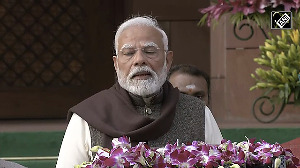What do you think needs to be done by the government and the great people of Mumbai to ensure such a disaster does not occur again? The third lot of responses are published below almost verbatim:
First responses: 'Stop blaming the rains'
Second responses: 'Mumbaities are equally to blame'
What can the government do when suddenly such huge rains come? This is a natural calamity which cannot be predicted.
It is better to stop blaming the government and for all business houses and NGOs to cooperate with the government to get things under control. People make the government, so all of us together have to solve this problem.
-- Rajeev Kumar
The last week has been very tragic indeed for Mumbai. The loss of life and property is actually unimaginable. While everyone seems to be pointing fingers at the government for not handling the situation well, don't you think we should be looking at ourselves also?
We treat each and every place except our homes like garbage bins. Whether it is our building staircase or the compound, the parks, the roads, the trains and the railway tracks, the sea... Empty packets of food and pan masala, plastic bags, leftover food -- one can see just about everything littered everywhere.
When we shifted to this office in Nariman Point, I was very pleased that I could see the sea from the window. However, for a very long time, I have felt that it would have been better if I did not have this view. Because all I can see is the muck floating in the water.
I travel by train every day and see women throw away empty packets of biscuits, chips, the paper in which their sandwich or bhel is packed, the skin of the peas they have cleaned. And these are the so-called educated women.... either inside the train itself or on the tracks (the ones who throw stuff out of the window consider themselves to be very thoughtful as they are not dirtying the train!) And if some of us ever try to tell them not to do it, we get nothing but angry glares in return...It is like "ulta chor kotwal ko daante".
Anyways, it is all this garbage that clogs all the gutters and does not allow the rain water to move out and cause flooding during normal rainfall also, leave aside the very heavy deluge of Tuesday.
I love my city and you cannot imagine how much it saddens me to say this, but I think Mumbai is the filthiest city in India and its citizens are all blind..Yes, we are all blind because we just don't bother to notice how much harm we are causing to ourselves... we are literally doing what is said in the proverb "apne pair pe kulhadi maar rahe hain."
The situation is very scary...and I am really at my wits as to how to bring about an improvement, how to make people open their eyes and see the devastating effects... I am horrified to think what the situation will be 10 years later if this continues...
I beg each and every citizen of this beautiful city to spare a moment and think...what are we going to leave behind for our children...mountains and mountains of stinky filthy garbage?
-- Rubeena
I have always appreciated the fact that Rediff provides a forum for readers to participate in analyzing and commenting on the news. So please know that any criticism in the following is primarily due the high expectations that I have of the Rediff team.
It appalls me that anyone would consider this to be the right time to talk about what needs to be done to prevent such a disaster the next time around. Such discussions can only be fruitful after all the data is collected and can be rationally analysed once we have solved the immediate problem of sanitation, hygiene, food, water, and electricity for the affected millions.
It is far too easy to cater to the gallery now, have a few emotionally charged discussions, and then forget it in a few months - didn't Nani Palkhivala say that the national bird of India should be Ostrich, not the Peacock? So the real topic of discussion needs to be -- what can we do quickly now and over the next couple of months to help Mumbai?
Sadly, I see some comments that border on blaming the victims. Let us not cheapen the loss of all these lives by dismissively talking about them as the "predictable collateral of the corruption in Indian polity". We all know that most of those who die in these disasters are the ones who have effectively no influence on politics or the politicians.
That said, I would be truly impressed with Rediff if it still has the institutional discipline and concern to bring this topic up for discussion after the immediate aftermath of the floods, a couple of months from now, when life is hobbling back to normalcy for most people.
To bring people's attention to important issues when there is no sensationalism or immediacy involved is one true measure of the value of the fourth estate. Traditionally in India, by that measure the fourth estate would go for a few paise in the open market. It would be comforting if evidence to the contrary were to be offered by the new wave of new media houses.
--Prem
Editor's note: Thank you Prem for your kind post. What do other readers think? Should we postpone this discussion for later? Or should we debate the issues now when the floods are fresh in mind and have not receded from our memory? Please let us know.
The following steps should be taken immediately:
A high ranking high power expert committee has to be constituted, consisting of a civil engineer, an hydraulic engineer, an electrical engineer, a traffic consultant for roads and rails, a doctor and a financial expert, to be headed by an efficient administrator, preferably a legal luminary with overriding powers and financial assistance.
The scope of the committee will be:
a. to study and suggest modern means, measures and methods to adopt, to plan and to re-orient the city and its neighbourhoods to ensure that they would remain clean, without inundation of water or water logging, without overcrowding of roads and railways, with widespread and adequate drinking water facilities, with uniform and stable power supply, adequate and right type of housing along with other types of buildings etc., and guarantee hygienic health.
b. to issue such instructions that may be deemed necessary to any authority in operation within the limits of Mumbai city and its neighborhood to stop any irregular activities that might aggravate the conditions specified above.
c. to suggest alternative actions to the authority concerned
d. to monitor actions of the above authority,
e. to recommend action against any authority acting against the suggestions of the high power committee..
f. to travel to such places of study
g. to draw necessary assistance from personnel of relevant fields
This expert committee must submit a final report within three months of its inception.
On receipt of the high power committee's report the state government will scrutinize it in detail and come out with its own modifications etc, within 15 days.
The state government will raise necessary funds from its own internal sources by levying additional low percentage surcharges against railway and road fares, electricity charges and municipal charges etc., for a period of one year from the date of tender.
The Centre will also assist the state by offering necessary assistance.
The state will float a tender within one month from the date of its modification of the high power committee report.
This tender will be finalised within a period of 15 days and the work order will be issued to the successful bidder company.
The company or companies in case of multiple tenders, will commence work as per the modified high power committee.
The company will complete all the works as per the terms of conditions in all respects within a period of one year from the date of issue of the work order/orders as the case may be on a war footing.
The high power committee will take over supervision duties of the work in progress, till they are completed.
Payments will be released in parts as per specification in the work orders, strictly on unanimous recommendation of the entire high power committee.
Organisations like Bombay First can be roped in for advice and assistance.
-- B Gautam
Where were the local corporators, elected representatives of people (both MLAs &MPs) who should have been with the people in their respective constituencies and spending the funds allotted to them? Instead of organising relief, they were conspicuously absent, perhaps till the next election.
The BMC failed miserably. Its employees are to be seen just before Ganesh festival removing garbage, perhaps with a view on baksheesh or in agitation for bonus or against abolition of octroi. Its miserable performance is enough to supersede it, if there is any provision
The behavior of politicians remind us of the famous saying that if there is no bread, let them eat cake. Or is it a case of Nero fiddling while Rome burnt?
Instead of politicians being with the people, the onus for damage control seems to have been thrust upon the police commissioner, who should be more busy in organising traffic, towing vehicles and taking charge of law and order situation and preventing anti-social elements from exploiting the situation.
Where were the RSS volunteers, who were to be seen at the time of every earthquake etc?
If 100 people die, one cannot reel off statistics and justify it saying that it does not affect even .001% of population. If Reliance has not restored electricity to Kurla, the residential electricity connection to the house of chairman and other senior officers should have been cut off to make them realise the pain, anguish and suffering of the people. His company should be heavily fined and that money should be used for rehabilitation efforts.
Most affected pockets should have been identified, and police put in charge of towing vehicles and prevent antisocial elements from looting, and NGOs should have been involved in organising relief measures.
The government must maintain a list of ham operators areawise to get in touch with them quickly to ascertain the situation. Simultaneously medical team should have taken care of health problems and for shifting the sick and needy persons to the hospital. Navy divers or army should have been pressed into service.
After this fiasco, the chief minister and his government has no moral right to continue in office.
I hope the media will ask the civil aviation minister, why the Instrument Landing System at Mumbai airport has not been repaired for such a long time and why only the shortest runway is being used for either landing or taking off.
There seems to be some serious environmental issue involved in the recent flooding and I hope the government will pay serious attention to rectify the past mistakes and prevent future ones so that citizens do not suffer like this.
We think of becoming a superpower, but beggars cannot become kings. Our poverty is not only material but also intellectual for which there is no cure unless there is a change in the mindset.
--Venkatraman
It is the poor planning and no drainage system which led to the way it is now in Mumbai. Every year even when the rains are normal, all roads get washed away. Does anybody care?
This incident should teach all Mumbaikars a few lessons, like not littering and to avoid using plastic bags.
Our politicians have a plan to make Shanghai of Mumbai.
Let me tell all of you that this is just not possible if each and every Mumbaikar doesn't support in keeping it clean. This is a big lesson for all of us, and if taken this well might be the first step towards making a cleaner Mumbai.
What would have happened if people had not thrown garbage and plastics everywhere? Well the answer is there would have been no water logging in the city.
All the dirty and filthy areas suffered the floods in the city, and other areas suffered because of them. We can't blame the government for everything. It is every Mumbaikar's duty to see that the city is kept clean. If you see a person littering go and slap him, he will not dare to do that next time.
Mumbaikars (we) will have to raise our level of cleanliness. You cant expect the government to come to help when the whole city is under the clinch of natural calamity What is the ratio of ministers: machinery: population? No comparison.
Sorry to say but the public is expecting something impossible. Even in US people will suffer if so much water logging takes place, and you are in Mumbai.
So wake up people and get back to work make Mumbai cleaner than it was. Make sure you do not plastic bags, and see that garbage goes where it belongs.
--Sanjeev
I fully agree with the opinion that the rains should not be blamed.
It is the poor town planning and the corrupt bureaucrats and (the politicians are always included in this ignominious list) who are solely responsible for the sorry state of affairs all over India.
Whenever there is a crisis we blame nature, we blame our neighbours, we blame a foreign hand, and everything under the sun except ourselves.
The fact is "we reap what we sow." No city however big or better or the best by any comparable standards can survive the fury of nature, but the main problem is we do not do enough to find a permanent solution for the overflooding, the blockage of drains etc.
Had the drains been cleaned at regular intervals a problem of this magnitude would not have arisen, but I am sure the politicians will politicise the issue and try to gain maximum mileage out of it. They will publish big advertisements in the newspaper asking for people to donate and then siphon off this fund for their political gains.
I hope the people of India realise this at the earliest and get down to the basics and realise that the true problem is not just nature or foreign hand. As long as we allow corruption, red-tapism to rule in our daily lives this will continue to plague us and every rain will be as dreadful as this.
Merely blaming the records since this was the highest in the century is no solace to the poor man or the victims of the fury.
In India even if mother earth or nature is taken care of, it is not enough.
The most corrupt in the world cannot be just done away with a magic wand. They are involved in all spheres of our life and there is only one thing which can minimise them -- pray and take a firm stand against corruption.
--Sanil Antony
Dubai
Torrential Tuesday left me shocked and completely astounded. Never had I thought that the famous Mumbai rains could turn into a devil devouring innocent.
Every newspaper and channel has been carrying news and reactions about 26/7.
With the justified anger against the inactive government (I did not see any help from any government body when I was wading through chest deep waters) I also happened to read reactions from common man like "what was the government thinking when it declared a holiday on Thursday? who was going to clean all the carcasses floating about endangering the city with an epidemic? where were all the BMC workers? how could they be given a holiday? who was going to clean up all the mess?"
I have no problems with people saying the government did not handle this disaster efficiently but a thought should be spared for those BMC workers (supposed to clean the mess). They probably are from a very low strata of the society and the rains have affected them as bad. How can we expect them to get back to work when we were at home on a Thursday?
I think solution would have been to invoke the Disaster Management Plan (which is said to exist somewhere). People from unaffected areas should be brought in for help. We cannot expect the people already facing the disaster to carry on their work normally.
Alas! I wish the government understands the importance of having a Disaster Management plan and invoking it at the right time.
--Deepa
Stop blaming the government for everything. After all, it is we who select the government and our attitude is no better than the ones who sit in the government.
Have we ever understood our responsibility as a citizen? Everybody wants to blame the system, but it is we make the system. Our callous attitude is to blame.
The government makes the law on plastic bags and we are the first ones not to follow them. Laws are for other people and not for me. We have very indifferent attitude towards society in general. We keep on throwing dirt everywhere when we are out of our homes.
Apart from bloodthirsty developers and builders who have, with money power, changed the plans of Mumbai town, we have helped our drainage system clog, very effectively, by throwing dirt whenever and wherever we can. And what do we feel about this? Are we ashamed? Absolutely not. That will be the day, when we start realising our responsibility towards the nation.
--Dinesh Pendharkar
I think it's not entirely right to blame only the government. The government historically has been known to be 'sleeping' over such incidents. Then how can one blame them?
What have the so-called people of Mumbai done in the past ten years? Such calamities cannot be controlled by humans. But now the problem of an epidemic looms large.
Mumbai as a city is severely unclean and not maintained to the mark. Even if local people get together and try to keep their surroundings clean and decongested, it would help them.
What environmentalists have been trying to say is proving true! Rampant urbanisation, no mangroves, no plantations, congested roads etc have caused the black Tuesday. People of Mumbai should not blame others (a typical Indian attitude). They should do their bit to maintain the city.
--Monil Hathi






 © 2025
© 2025